










•The importance of effective supervision • and more... Introducing our new President
ALSO: • Research at the University of Worcester’s School of Law














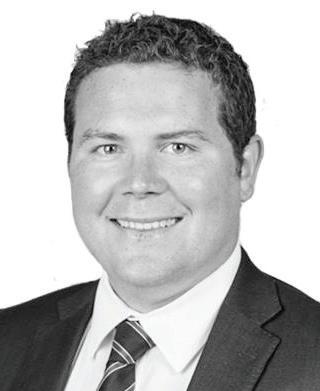
Elizabeth Miles President Greens Solicitors elizabeth.miles@greenssolicitors. org
Laura Osborne Administrator Headturner Search laura@headturnersearch.co.uk


Nick Hughes Committee Member HB 121 Solicitors nah@hb121solicitors.co.uk

Vishal Mahay Committee Member Silverback Law vishal.mahay@silverbacklaw.co.uk
James Osborne Treasurer Harrison Clark Rickerbys josborne@hcrlaw.com
Amy McGowan-Docherty Editor of The Pears magazine Harrison Clark Rickerbys amdocherty@hcrlaw.com


Georgina Groves Committee Member Harrison Clark Rickerbys ghunt@hcrlaw.com
Jenny Watkins Committee Member University of Worcester jenny.watkins@worc.ac.uk


Kate
Haynes Law katec@bradleyhayneslaw.co.uk

Alexandra Phillips Committee Member mfg Solicitors LLP alexandra.phillips@ mfgsolicitors.com
Luke Crocker Committee Member Bradley Haynes Law Luke@bradleyhayneslaw.co.uk



Marina Akram Chair Silverback Law marina.akram@ silverbacklaw.co.uk

Molly Batten Vice-Chair mfg Solicitors LLP molly.batten@mfgsolicitors.com
Emily Willett Secretary mfg Solicitors LLP

Zahida
Charlette McDermott
Haynes Charlette@bradleyhayneslaw.co.uk
Andrew Chandler Committee Member mfg Solicitors LLP andrew.chandler@mfgsolicitors.com

Dear Members,
The only job I have ever wanted to do is the one I am doing. Child Care law, acting for parents and children in cases brought by the Local Authority Having gone through a pre Children Act adoption when I was 9 (yes I am ancient), I experienced being interviewed by a
Social Worker and terrified by a judge. I didn’t understand what on earth was going on, and I thought I would lose my family if I said the wrong thing. Since qualifying 20 years ago, I try to make sure that whoever my client is, parent, child or relative, they understand what is happening to them. Representing those who have learning disabilities, or are particularly vulnerable is my strength.
I have always worked in Worcester (bar a small aberration when I sampled the delights of Somerset for 2 years) and mainly on Foregate Street, under the watchful eye of Queen Victoria, proudly glaring down at all who pass by the Shirehall. Even before I did my Training Contract at Lumsdon Grindley, I did some work experiences, Alexander & Co (who still had electronic typewriters) and with MFG (with a young Associate named Iain Morrison – not sure what became of him!)

I love what I do, and enjoy training our new starters. I do get carried away with my enthusiasm at times and am told off for being far too cheerful.
I am really pleased to be President of the Worcestershire Law Society this year and look forward to meeting as many of you as possible at our various events throughout the year. Please do come along and get involved they are great for networking and for just having fun. The work we do for clients, no matter what our discipline, is tough, sometimes thankless, but so worthwhile. Supporting each other can only be good for our wellbeing, connections and sanity!!
Elizabeth Miles President, Worcestershire
Law Society 2024-2025

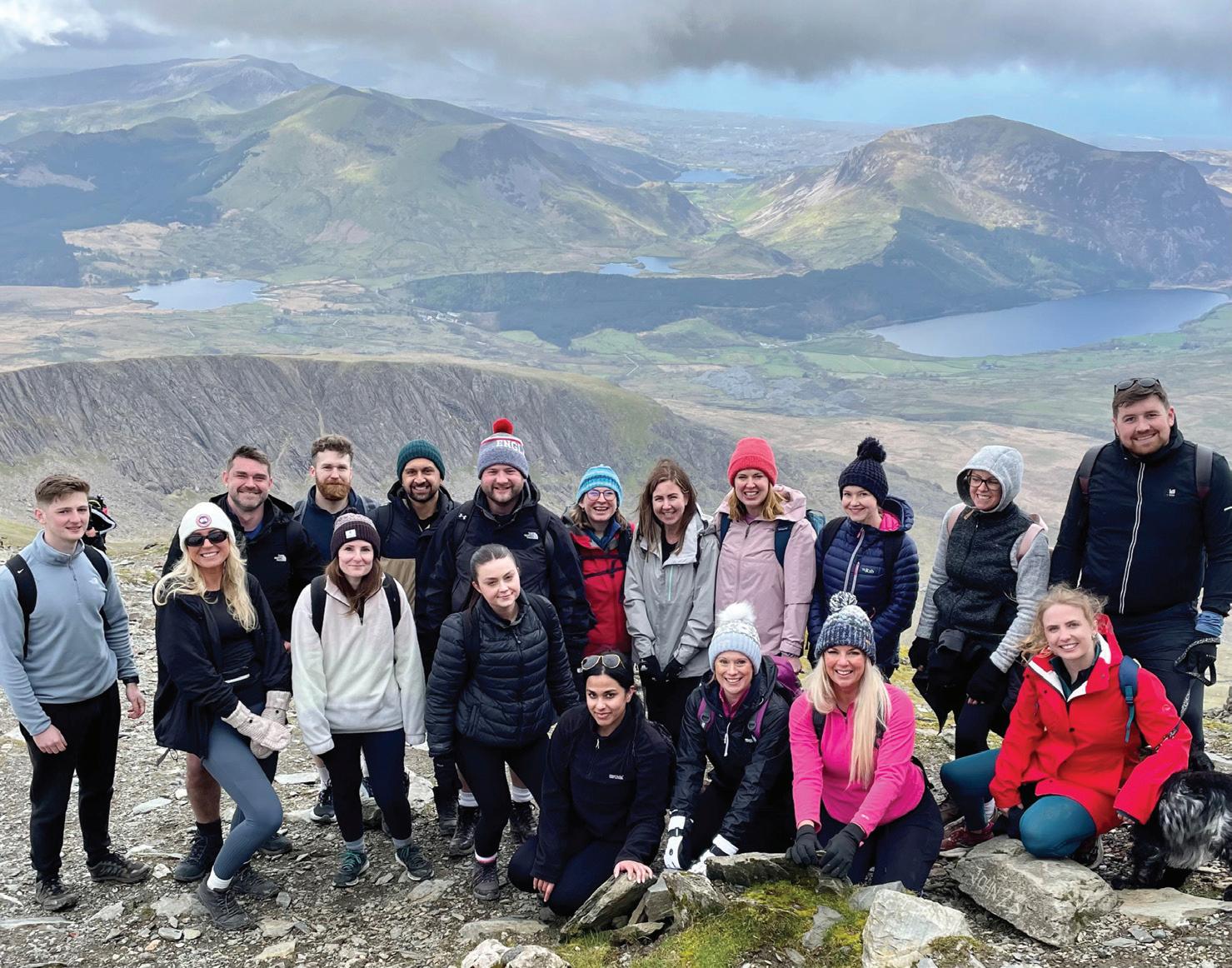
Local lawyers take on Snowdon in aid of local family charity
A team of Kidderminster lawyers have completed a grueling 12km Snowdon hike to raise funds for a local family-focused charity.
The group of 18 lawyers from mfg Solicitors, together with family and friends, completed the climb up the highest peak in Wales in six hours. So far, they have raised over £3,600 for charity, Home Start Wyre Forest, which offers a variety of advice and practical help to families with children under the age of 18.
Lucy Harrold, a solicitor at the law firm said: “As our Kidderminster office’s chosen charity for this year, we managed to encourage 18 staff from across various departments to take part in the climb. It was a great way to raise money for our local Home Start, which does so much for hundreds of families across the local community every year.
“Snowdon is known for testing people’s mental and physical strength and it was certainly very tough. However, it was all about having fun and trying to hit our target for the charity, which supports around 400 children and their families each year.
Darby from Home Start Wyre Forest said: “We are so grateful for the support. Not only have the team had to endure the hard climb that Snowdon is known for, but they have also chosen us as their charity to support for the whole year.”
Readers interested in donating further to the team’s fundraising efforts can visit their GoFundMe page through https:// gofund.me/9495ed94
HCR Law continue to support its very own Olivia Mitcham and Worcester City Women FC
As Official Legal Partner to Worcester City Women Football Club (WCWFC), we continue to support their league success. This is in part due to our very own Trainee Solicitor, Olivia Mitcham, who is WCWFC star-striker having scored an impressive 31 goals already in this season’s campaign. Of the partnership, Olivia said “Having HCR as an official partner of WCWFC demonstrates the strength of the company’s community ties and will ensure that women’s football can continue to thrive in Worcestershire and beyond. On a personal note, it is fantastic to have HCR’s support both inside and outside of the office, and I am excited to see the opportunities that this collaboration brings for young girls in Worcester!”
Both HCR and WCWFC share a passion for promoting excellence in women's football and fostering strong community bonds. WCWFC is on a journey to ascend through the women's football pyramid in a sustainable and successful manner, and plans include working together on community projects and supporting the commercial aims of the club.
WCWFC and owner, Nicole Allison, said of the partnership “This partnership represents another milestone for the club,


and we’re looking forward to working closely with HCR to build a strong and sustainable future for women’s football in our community. Their passion and desire to support us was evident from our first meeting.”
With just three games left of this season, WCWFC hope to win the league and HCR will be supporting the women towards the end of the season.
Law firm mfg Solicitors announces ten partner and associate promotions
Midlands law firm mfg Solicitors has announced 10 promotions across various departments, including the appointments of three new partners, two senior associates and five associates.
Respected residential property specialist Sharon Lerry has been promoted to partner along with colleagues, Beth Tutchener-Ellis a family law expert, and Tom Bell from the firm’s Agriculture and Rural Affairs department.
The firm has also announced two senior associate promotions, with Rebecca Rogers in its Litigation department and Phil Hunt from the firm’s Commercial Property department both stepping up from associate level.
Meanwhile, the firm has confirmed five additional promotions with Residential Property specialists Lucy Beaumont and Hayley Pearce, Victoria Wall from Contentious Probate, Nazia Riaz from Private Client, and Litigation specialist Rachel Gill, all being promoted to associate level.
Andrew Davies, partner and managing director of mfg Solicitors said: “We’re continuing to expand in a variety of areas with more and more people and businesses turning to us for professional advice.
“This means we must have nothing but the best people in place, so I am delighted with these latest promotions which stretch across several of our departments and offices.
“To see Sharon, Beth and Tom step up to become partners is a proud moment for us, and I have no doubt they will prove to be superb appointments in the months and years ahead.
“Meanwhile, having many more of the team stepping up to become senior associates and associates shows we’re well prepared for the future in a number of specialisms.
“I’d like to congratulate each and every one of them.”

HCR Law ranked first across UK for M&A deals: Experian
HCR Law have been ranked first across the United Kingdom for merger and acquisition (M&A) deals according to Experian MarketIQ’s Q1 M&A review of 2024, reinforcing the firm’s leading position in the market.
Continued high demand has seen HCR Law ranked first for deals the South East – a movement of four places from the previous report, South West – moving up three places, East of England and the Midlands – moving up five places.
The firm took second place in Wales and third place in London, moving up five places from the previous report. The report states that “acquirors seem keen to push ahead with strategic high value dealmaking” with M&A value surging in the first quarter of the year.
Richard Wilkey, Head of National and London Corporate Teams, said: “I’m delighted we’ve once again taken the top spot in these rankings. HCR’s offering continues to attract a high level of M&A across the country; we know what our clients want and how to help them achieve that.
“This is excellent news for businesses who are looking to grow and widen both their offering and their client base. I’m keen to see what the rest of the year holds for us and our clients – both in the UK and further afield.”
A record number of instructions and continued growth sees promotions at bradley haynes law
Andrew Bradley, C.E.O, is delighted to continue to recognise and reward talent within the Firm with the promotions of Adam Tranter to Associate Solicitor and Philippa Baker to Conveyancing Executive.

Adam joined Bradley Haynes Law in August 2023 as a solicitor within our residential conveyancing team. On joining he expressed his passion for excellent client communication and care as being core to the way he delivers for the clients he is supporting with their property matters.
This passion has been demonstrated daily, Adam brings with him a wealth of legal experience which he openly shares with our trainee solicitors and colleagues to aid their training and development and is spoken of highly by our local agents and introducers.
Adam’s team spirit and client commitment is to be championed and it is therefore with great please that we can announce Adam’s promotion to Associate Solicitor with the Firm.
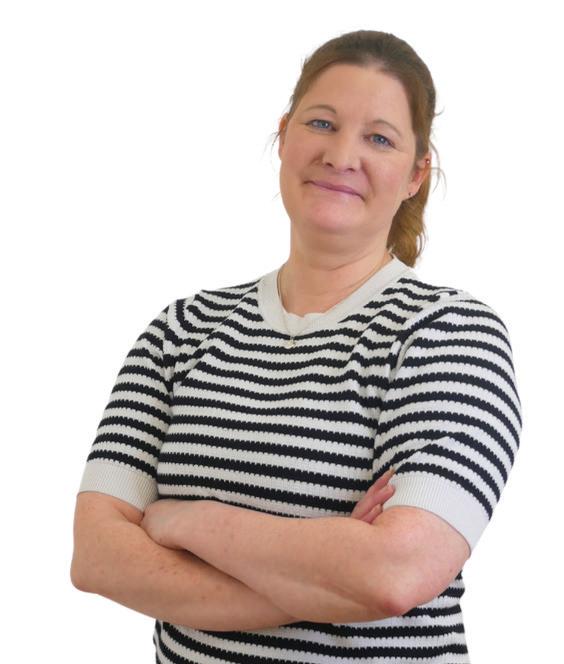
Although starting out on a medical pathway in her younger days, a summer holiday spent supporting in her Uncle’s Law firm saw Philippa bitten by the legal bug and she never looked back!
Philippa moved to Worcester from the Wirral in 2008 and joined Bradley Haynes Law in late 2023 bringing with her over 20-years industry experience. Philippa’s teamwork has shone though since joining the firm and especially over the past sixmonths where she stepped up and has worked tirelessly and selflessly to support the temporary absence of a valued team member, to ensure that our clients still received the very best care.
Philippa’s high levels of team support and client care have been equally matched by technical knowledge, and we are pleased to recognise these efforts with a promotion into the role of Conveyancing Executive.
Supporting and developing our team is a key mantra of the firm and we are very pleased to share our team’s exciting and well- deserved news.
HCR Law announces over sixty promotions in biggest round to date
UK law firm HCR Law has announced its biggest promotions round to date, with more than sixty lawyers promoted across the firm’s business services and private client teams.

This latest round of promotions is testament to the firm’s commitment to growing talent and recognising the valued contribution of its people. 8 Partners, 7 Legal Directors, 10 Senior Associates and 27 Associates – who were all promoted on 1 April 2024 – join 8 newly qualified solicitors who completed their training contracts with the firm in March.
The Worcester office is delighted to announce multiple promotions spanning across various teams and levels within the business. Daniel De Saulles, Helen Higginbotham and Eimir Tuckett have all been promoted to Partner; Alyson McGowan to Legal Director; Katherine Dakers and Gurinder Hayer to Senior Associate; and Oliver Hunt Amy McGowan-Docherty, Catherine Owlett and Rhondda Ramdin to Associate. We also have newly qualified Solicitor Manyara Matambanadzo who has joined the Commercial team.
Rod Thomas, Managing Partner, said: “Often, when people join us from other firms, they remark that we’re a different type of law firm. They recognise that if they’re ambitious for their clients and work hard for client success, they will be valued and rewarded.
“The sheer number of promotions this year shows that the firm is in a strong position. We’ve invested significantly in developing our staff by extending our mentoring and coaching programmes, and ensuring we provide a growing range of opportunities, for example through our international
secondment offer. I’m delighted for those that have been promoted, and look forward to further supporting them with their careers.”

Private Client team shortlisted for trio of awards at Modern Law Private Client Awards
HCR Law’s Private Client team have been shortlisted for a trio of awards at the Modern Law Private Client Awards.
The three awards include Private Client Team – Wills and Probate, Private Client Team – Tax and Trusts and Best Paralegal. The black-tie awards ceremony, which takes place at the Rum Warehouse in Liverpool, celebrates and champions the work delivered across the Private Client industry. Other awards include Outstanding Client Care, Best Workplace Wellbeing and Law Firm of the Year.
Hosted by comedian and TV personality Paul Sinha, the evening includes a drinks reception and dinner followed by the awards ceremony and subsequent entertainment.
Last year, Private Client Partner David King
won Lawyer of the Year – Wills and Probate at the ceremony.
Following the shortlisting, Partner and Joint Head of Private Client Alex Taylor said: “I’m delighted that we’ve been shortlisted for these awards – client care is at the heart of our Private Client offering, so to be recognised alongside other worthy contenders for these awards is heartening.”
Daniel Curtis , Partner and Joint Head of Private Client, said: “ To echo what Alex has said, I’m pleased we’ve been recognised by the Modern Law Awards; our aim is to provide outstanding legal advice and care to our clients, and our shortlisting at the ceremony shows that we achieve that.”
Respected Worcestershire solicitor Suzanne Lee to retire after 27 year career
One of the region’s most respected senior solicitors has announced her retirement.
Nationally-recognised contentious probate specialist Suzanne Lee, a partner at mfg Solicitors, will retire at the end of April following a 27-year career at the law firm where she is credited as a driving force behind its expansion – including 10 years as its managing director.
Ms Lee joined mfg Solicitors in 1997 as a trainee, qualifying in 1999 and going on to specialise in complex contentious probate cases across the UK. Rising quickly through the ranks, she became a partner in 2002 and sat on the firm’s Management Board between 2003 and 2010, stepping down to project manage the firm’s high-profile move to its Adam House headquarters in Kidderminster.
She returned to the Board in 2012 to take up the role of managing director which she held until 2022. During her 10-year stewardship, she led the firm’s regional growth by overseeing a trio of mergers with Bromsgrove’s Scott Holt & Sellars, Ludlow firm Phillips & Co, and Birmingham-based Pearson Rowe. Ms Lee is also credited with steering the firm safely through the challenges of the 2020 Covid pandemic.

After she stepped down as managing director to hand over to partner Andrew Davies, she was also the firm’s chair between July 2022 and March 2023, with partner Iain Morrison now in the role.
Iain Morrison, chair at mfg Solicitors said: “Suzanne has made an immense contribution to the success and reputation of the firm over nearly 30 years. Not only is she recognised in the Legal 500 as a superb lawyer, but her drive, leadership and vision has helped us to grow and modernise as a firm.
“She will be missed by us all, and on behalf of everyone at the firm, I wish her well for what I’m sure will be a long and relaxing retirement.”
Suzanne Lee added: “After nearly three decades as a solicitor I felt it was the right time to retire and pass the baton on to the next generation.
“During my time at mfg Solicitors I have been fortunate to work with so many wonderful people, and great clients, whilst also being at the centre of our growth and modernisation. I can step away extremely proud of what I’ve achieved and look back on the past 27 years with so much joy and satisfaction. I retire with the firm in safe hands, and strongly positioned for further growth."
Over 100 guests from across the region

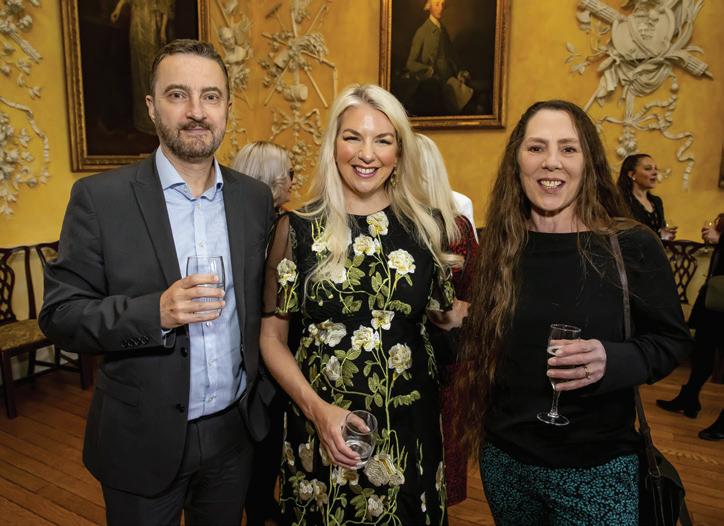
joined partners and staff from mfg Solicitors to mark the retirement of nationallyrespected solicitor, Suzanne Lee.
Guests were treated to a canape and drinks reception at the event which was held at the iconic 18th-century stately home, Hagley Hall.
On 11th April the WLS hosted a cheese and wine evening at King's School Boat House where Lee Anna Rennie-Johnson
(aka “The Diary Made”) provided those in attendance with an informative and delicious education in pairing the right wines with the right cheese.
The attendees were able to appreciate the stunning grounds of King’s School whilst enjoying a welcome drink in the sunshine.

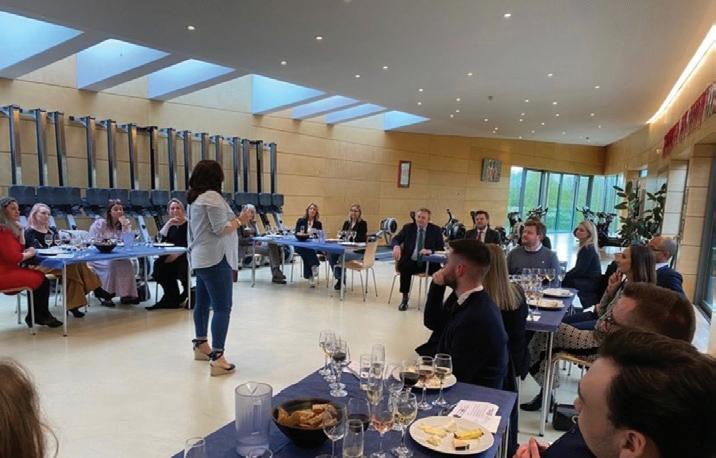

Our recent charitable activities
For 2024/25, our office chosen charity is Worcestershire Breast Unit Haven (WBUH). Our first fundraising event was a badminton tournament with our clients and contacts, led by Head of Real Estate Healthcare, Syed Alam
Family Law Partner, Anita Hennessey, recently completed the 2024
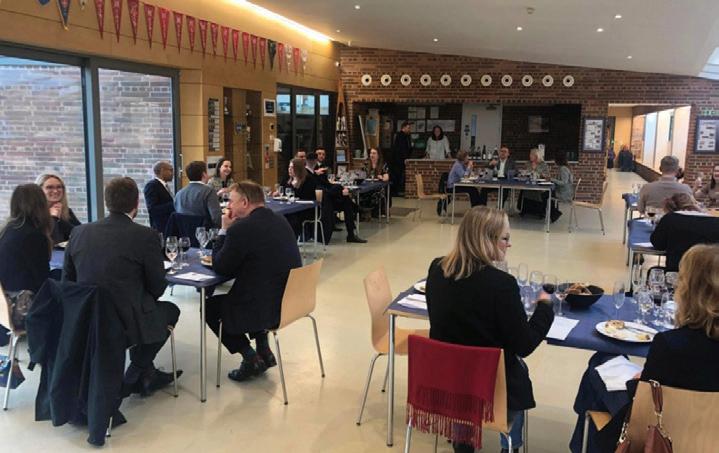

London Marathon in 4h17m, despite injury. Anita raised £3,565 for Wooden Spoon Worcestershire, a charity that supports young disadvantaged people in the local area.
Lead Cashier, Petra Pocock , recently flew to Jordan to take part in a five day trek, walking 10 miles a day through the rocky desert to the city of Petra. Her impressive adventures raised £3,822 for St Richard's Hospice.



The School of Law is home to the University of Worcester’s Constitutions, Rights and Justice Research Group, directed by the Head of Law and Principal Lecturer, Dr Chris Monaghan. The Group has been used as a vehicle to advance and disseminate research, including through conferences (e.g. on the Chagos Archipelago in 2023), public lectures (e.g. by Rt Hon Sir Robert Buckland KC in 2023, and Sir John Saunders in 2024), and research workshops to support and train members.
Research is a core part of our work at the School of Law. We focus on an array of national and international issues and seek to impact local, national and international law and policy. Research also informs our teaching and learning. This has no doubt contributed to our ranking in The Times and Sunday Times’ University League Table where our LLB Law degree is first in the country for teaching quality. Since opening in 2016, the School has commenced its PhD programme which continues to welcome students whom we supervise to generate unique contributions to law.
This segment aims to introduce our researchers at the School of Law to the local legal community and explore their recent and ongoing work. We welcome collaborations with local and national partners whom we can offer our advice and expertise. Full biographies and lists of publications can be found on the University of Worcester website. Any questions concerning staff research can be directed to m.lane@worc.ac.uk
Dr Michael Lane
Michael is a Lecturer in Law and the School of Law’s research lead. Michael’s research concerns the role of international human rights and the United Nations in the United Kingdom. His work has informed projects with the Equality and Human Rights Commission, evidence before the Joint Committee on Human Rights, and reports to the United Nations. Michael’s publications include:

• Lane, M. ‘Navigating Devolution at the UPR – The Case of the United Kingdom’ in Etone, D. Nazir, A. and Story, A. Human Rights and The UN Universal Periodic Review Mechanism: A Research Companion (Routledge 2024).
• Lane, M. The Universal Periodic Review: A Catalyst for Domestic Mobilisation (2023) 40 Nordic Journal of Human Rights 507.
• Lane, M. The UK Joint Committee on Human Rights and the United Nations Universal Periodic Review (2022) 14 Journal of Human Rights Practice 928.
Michael is currently working on a series of projects drawing on his doctoral research. These include papers on how Universal Periodic Review recommendations can be used in domestic courts, and the relevance of United Nations human rights mechanisms processes in policymaking.
Dr Chris Monaghan

Chris is the Head of Law and a Principal Lecturer in Law. Chris has a keen interest in Constitutional Law, the role of Parliament (with an emphasis on accountability), broader notions of

executive accountability, and the global use of impeachment. He also researches on the Chagos Islands legal dispute. Chris’s publications include:
• Monaghan, C. ‘Returning to Bancoult’ (2023) 27(4) Judicial Review 337
• Monaghan, C and Flinders, M (eds), Questions of Accountability: Prerogatives, Power and Politics (with a foreword by Lord Neuberger) (Hart Publishing 2023).
• Monaghan, C. Accountability, Impeachment and the Constitution: The Case for a Modern Process in the United Kingdom (Routledge 2022)
Dr Chris Monaghan and Dr Robin Eagles (History of Parliament Trust) are convening a conference on the impeachment of Warren Hastings, the former Governor-General of Bengal, that will be taking place at Worcester in July 2025. The conference is being supported financially by Parliamentary History. The keynote speaker is Professor Dame Linda Colley, Princeton University, USA. Contact schooloflaw@worc.ac.uk for more info.

Nicola is a Principal Lecturer in Law and a member of the Honourable Society of the Middle Temple. Nicola’s research interests include jury misconduct and the criminal trial and she has published a wide range of journal articles. Her work has been cited widely by academics and by the Law Commission. Nicola’s publications include:
• Monaghan, N. (ed) Contemporary Challenges in the Jury System: A Comparative Perspective (forthcoming, Routledge 2024)
• Monaghan, N. Chapter on Jury & Witness Intimidation (Title TBC), in D Jasinski and N McGuirk (eds), Citizens, the State and Justice: A multidisciplinary perspective (forthcoming Routledge 2025)
• Monaghan, N. Criminal Law Directions (Oxford University Press, 2023, 7th edn).
Nicola is also working on the 8th edition of Criminal Law Directions (Oxford University Press) due to be published in 2025.
Dr Josie Welsh

Dr Josie Welsh is a Senior Lecturer in Law (Teaching) and the LLB Course Leader. Josie has research interests which focus on the topic of judicial power, constitutional reform and its effects on the judiciary and political science. Josie has presented papers at national and international conferences, is a member of the Advisory Board for Routledge Frontiers in Accountability Studies. Josie’s publications include:
• Welsh, J. ‘Looking beyond the traditional: a multi-dimensional account of the modern judicial role’ (2024) Judicial Review, forthcoming.
• Welsh, J. Judicial Power in Theory and Practice: A Legal and Political Analysis (Routledge, forthcoming 2025)
• Welsh, J. ‘The Power of a (Lord)
Chief Justice’ 3rd July 2023, UK Constitutional Law Association Blog. Available at: https://ukconstitutionallaw. org/2023/07/03/josie-welsh-the-powerof-a-lord-chief-justice/
Dr Aisha Shah
Aisha is a Lecturer in Law at the School of Law. Her research interests lie in the field of English Private Law and in particular claims for restitution in equity, trusts and unjust enrichment. Aisha’s publications include:
• Shah, A. ‘Unjust Enrichment and Proprietary Restitution’ (2021) 85 The Conveyancer and Property Lawyer 352364.
• Shah, A. ‘Proprietary Restitution and Receipt by Insolvent Agents: Angove’s Pty Ltd v Bailey’ (2017) 31 Trust Law International 30-36.
Aisha runs the School of Humanities Public Speaking Club as an extracurricular activity for students, as well as the annual public speaking competition which is open to all law students. The School of Law would be interested in hearing from members of the legal community who would be interested in providing assistance to our students in relation to advocacy, mooting, public speaking or presentation skills for either our Mooting Club or Public Speaking Club at the School of Law. Please contact Dr Aisha Shah if you are interested in connecting with us in this regard: s.shah@worc.ac.uk
Illustration opposite: 'The bow to the throne, - aliasthe begging bow' by James Gillray, published by Samuel William Fores. Hand-coloured etching, published 6 May 1788, NPG D12378. Available at https://www.npg.org.uk/collections/ search/portrait/mw61339/Thebow-to-the-throne---alias---thebegging-bow
Neil Bowyer of the firm’s Dispute Resolution Team has shown that tenacity and hard work can pay off in the most difficult of circumstances, with a favourable court outcome in March 2024 for his client in a longrunning property development dispute.

Neil says: “This was one of the first cases I picked up when I joined Bradley Haynes in 2018 and I am delighted with our client’s success. The clients have fought hard for this outcome over the last six-years, and they can now look forward to the future.”
The dispute arose out of a breakdown in the relationship between our client and their joint venture partner in relation to a property development. The parties had agreed that our client would construct several properties and renovate another, with the other party providing some of the initial investment. The properties were to be sold, with each party recovering their initial investment (and build costs in the case of our client) and equally dividing any remaining sale proceeds.
Unfortunately, the agreement between the parties was an informal one and was not properly documented, based largely on trust and a very short joint venture agreement.
When the relationship deteriorated, the other party claimed ownership of the finished properties and challenged our client’s entitlement to receive any money
from the project, despite them having invested a large sum of money and several years of labour into the build.
The lack of an adequately drafted joint venture agreement meant that our client’s recovery was not straightforward. Neil Bowyer explains:
“In the absence of a clear written agreement, our client had to instead satisfy the court that a constructive trust had arisen, by evidencing that they had spent time and money in reliance on promises made by the other side, so that although the other party legally owned the properties, our client had a beneficial interest in the properties and therefore an entitlement to share in their increased value as well as claw back the money our client had spent on improving those properties.
An added complication was the somewhat sparse nature of our client’s evidence, they having retained receipts for building materials bought for the project, but not having kept any separate financial or bank accounts for the joint venture.”
After a three-day court hearing, the judge found in favour of Bradley Haynes’ client. He was satisfied that a constructive trust did exist between the parties and ruled that our client was entitled to the recovery of their initial investment and build costs as well as an equal share of any remaining sale proceeds. The total sum recovered was in excess of £300,000.
The origin of the dispute between the parties in this case was the informal nature of the agreement. The parties were known to one another, and, at the point of contracting, they appeared to have a mutual understanding as to how the agreement would develop over time and what each of the parties could expect out of it.
Unfortunately, as time when on, each party developed different ideas as to
what was originally agreed and that, along with the lack of record keeping, led to a breakdown in trust.
There is, of course, nothing wrong with friends and acquaintances going into business with one another but this case illustrates what can happen in the absence of a written contract, when trust breaks down and things go wrong.
Court proceedings are time consuming and expensive and a well drafted contract which clearly sets out expectations can avoid this, by clearly setting out the expectations on each party, ensuring that there is no confusion over who does what, who gets what, or at the very least by referring any disagreements to mediation or arbitration instead of court.
The initial outlay for such a document is a lot less than the cost to all parties of a joint project going south, and the existence of a clear written contract along with well-kept records can often preserve a commercial relationship even after a disagreement.
How we can help?
Bradley Haynes Law prides itself on its collaborative and holistic approach to providing legal services to its clients. The firm’s teams collaborate closely when advising clients, with our lawyers working together across specialisms to provide the best outcomes for our clients.
Our clients are valued and have a single relationship manager at the firm, whilst also receiving wrap-around support from other specialists at the firm as their legal needs change and evolve.
Whether you are a private individual or business, if you need legal support concerning either a transactional or contentious matter, get in touch with Bradley Haynes Law today and find out how we can help.
01905 900 919 welcome@bradleyhayneslaw.co.uk

It is clear that the landscape of family law is changing and as a result, separating families need more options to help them find a resolution. An increasing number of couples are putting off seeking advice from family lawyers because they believe that it will be costly and result in prolonged acrimony through the court system – they are often right, but they have perhaps not had the opportunity to explore the other routes that are available to them.
In April this year there was a welcome change to the Family Procedure Rules concerning Non-Court dispute resolution. This will be at the very heart of each and every family law case and there will now be a much greater expectation on separating families to engage in non-court processes. Parties in court proceedings will be obligated to file a form at least 7 days prior to a hearting setting out their views on engaging in these processes and explaining whether they have made attempts to reach an agreement away from the court. Failure to engage could result in costs orders being made and the courts will also have the power to put proceedings on hold if it is felt that non-court dispute resolution would be appropriate and to allow the parties time to engage in a suitable process.
In order to adapt to needs and ensure that we are able to offer our clients a bespoke service, we have a new national initiative known as ‘Unified in Separation’ or ‘US’ for short. This is essentially a collaboration of all methods of non-court dispute resolution, which are available to assist couples and families going through separation. There are many non-court methods available to separating couples, which are currently under-utilised, and which remain largely unknown or misunderstood. These include Mediation, Arbitration, Early Neutral Evaluation, Collaborative Law, One Lawyer One Couple, Private FDR’s and Round Table Meetings. These options all have one thing in common – to try and keep family matters out
of court and reach an amicable conclusion. At the outset, we will offer each client an options meeting, to discuss what method or methods of non-court resolution may be right for them and we will also take the time to consider whether any other professionals may be able to assist, such as an independent financial advisor or a therapist.
Our offering embraces a collaborative and more holistic approach to family law. It allows separating families to feel empowered in reaching a resolution and to have the freedom, confidence and knowledge to choose alternatives to court which will help them resolve family conflict, move forward, have more say over their families future and ultimately, do it their way.



Many people contact LawCare for support as they lack suitable support and effective supervision at work. Hybrid and remote working can make supervision seem more difficult, and many people working in the legal sector have contacted us feeling disconnected from work, their teams and their manager. This has been a real issue for junior lawyers and those in training, who have felt particularly isolated and have often felt unable to ask for help on a work or personal issue. The good news is that implementing an effective supervision process is fairly straightforward and can have a hugely positive impact on the culture in a legal workplace.
What do we mean by supervision?
There are two areas of supervision that are essential. One is an effective line management process, with people having someone to talk to about their workload and any concerns they have, but also about how they are personally. It’s an opportunity for managers to see how someone really is, to offer feedback and praise where warranted, advice on a tricky issue and it also provides a space for lawyers to flag any problems. It’s not about being told what to do or being told what you’re doing badly, it’s an opportunity to share, normalise feelings, strengthen a working relationship and build trust.
In our Life in the Law research into legal workplaces wellbeing we discovered that of a wide range of workplace measures available to support mental wellbeing, from private health insurance to mental
health training, regular catch-ups or appraisals were reported to be the most commonly available and also the most helpful. A recurring theme was also simply the desire to be ‘heard’ and listened to. Having these in place helped to bolster confidence in personal development and reduce anxiety. It also helps to create psychological safety, an environment where someone can raise a concern, admit a mistake, ask a question, or ask for help, without the fear of negative repercussions.
The effectiveness of regular catch-ups can be improved by ensuring that supervisors and line managers have the skills to effectively undertake their supervisory/ managerial roles. This can be achieved through adequate management training. Our Life in the Law research found that less than half of participants who indicated they worked in a position of management or supervisory capacity said they had received leadership, management, or supervisory training. Where training had been provided, 89.4% said it was helpful or very helpful.
The other type of supervision that is needed is with a trained supervisor, counsellor, or psychotherapist, not as a short-term intervention to help with a mental health issue but as a regular opportunity to offload some of the emotional baggage that comes with the law. Allowing some space and time within the working week or month to reflect on their own practice, to share experiences and to learn techniques to cope with the emotional impact of the work.
Everyone working in the legal sector who is regularly in contact with a vulnerable or emotive client group needs a chance to process how those emotions impact on them. The lawyer-client relationship can be complex as lawyers are often working with people at an emotionally difficult and stressful time in their lives when they are facing a loss of liberty, employment, relationships or reputation, managing a death in the family, or selling or buying a house. People working in the legal sector often absorb that emotion, and this can affect you unless you are trained to recognise and understand these emotions and their impact.
Supervision in this context is about someone taking care of you so that you can do your job to the best of your ability and meet the expectations of your clients and colleagues. You can talk to someone who is really listening, about what is going on with your work and help you get a handle on things. Talking can reflect back to you what is going on and help you identify the different options available to you. Sometimes in the law we can have an invisible armour that we wear, and an image that we have to portray. Supervision is about letting that go and having a safe space to be you.
It is vital that legal workplaces take supervision seriously and invest in it appropriately. Organisations may need additional support or training in order to provide adequate supervision. They may need to engage the services of a third party such as a counsellor for people working in emotionally difficult areas of law. There should also be adequate time built in for managers to supervise effectively, so it is not overlooked.
In any legal organisation the people are the greatest asset, and to protect those people from burnout, to create a healthy culture, to ensure retention and success, investing in supervision is key.
LawCare provides free and confidential emotional support, peer support and information for anyone working in the legal sector. If you need support call us on 0800 279 6888, email support@lawcare. org.uk or go to www.lawcare.org.uk. We understand life in the law.


Cyber Insurance has grown in popularity in the last decade as organisations realise their most valuable assets and biggest liability is often the data they handle. With billions of interconnected devices worldwide, a huge reliance upon data and electronic communications and cyber enabled crime now outstripping all other crimes combined it makes sense to see this as a top tier threat. Cyber Insurance is designed to assist organisations who suffer an accidental or deliberate data or cyber incident with the hands-on support they require in an emergency, with the aim of returning them to the position they were before.
How does a claim work with a typical cyber policy?
• The policyholder contacts the insurer’s crisis management contact centre who will provide technical and forensic experts to find the problem, stop the problem and restore systems and data. These experts will compile the details required to notify data subjects and regulators as well as assisting with extortion and ransom situations.
• A standard policy will also cover the legal costs to deal with data protection, regulation, litigation and contractual issues, and PR costs to limit reputational damage.
• Polices can also reimburse ransoms, pay business interruption losses, reimburse stollen funds, replace equipment and, where permissible, pay fines and penalties.
An interesting development is cyber insurance is increasingly a contractual requirement when tendering for businesses in the same way that public

liability and professional indemnity are. This is for 2 reasons; firstly the liability risk of valuable data or unwelcome viruses being maliciously or accidentally transmitted via the supply chain, secondly the business continuity requirement that organisations are not catastrophically impacted by an incident.
You will not be surprised to hear that cyber insurers prefer to cover organisations who have a robust approach to cyber security, including staff awareness training, especially if that organisation processes large amounts of sensitive data. For this reason some sectors are more expensive to insure, especially if they have the additional pressure of being regulated –which is bad news for law firms looking for cover!
If you would like to know more or would like assistance talking to your clients about cyber risks contact Sutcliffe & Co Insurance Brokers on 01905 21681 or email enquires@sutcliffeinsurance.co.uk



Our annual consumer tracking study has found that public appetite for legacy giving is on the rise, with more than one in five charity donors (21%) aged 40+ saying they have included a charitable gift in a Will, up from one in seven (14%) in 2010. Over the same period, rejection of legacy giving has dropped from 13% to 9%.
Figures from 2023, released today, found that supporters with a Will in their 40s and 50s are most likely to have pledged a legacy gift – with almost four in ten (37%) having included a charity. This compares with around one quarter (27%) of those aged over 60. Legacy pledgers are also more likely to be single and without children or grandchildren. Pledger rates are highest amongst those who are affluent, aware of the inheritance tax incentives and who have sought professional advice for their finances.
Three quarters of supporters (77%) say they would be willing to leave a small percentage of their estate to charity, with more than one in ten (13%) saying they would be open to leaving 10% or more of their estate.
Our consumer benchmarking study*, carried out by independent research firm OKO, surveys more than 2,000 charity donors aged 40+ to track legacy giving attitudes and behaviour year-onyear. Over the last 14 years, the study, which follows Prochaska’s Stages of Change model, has tracked long-term forward movement in legacy giving from awareness through to preparation and action.

Lucinda Frostick, director of Remember A Charity, welcomes the findings, saying: “This study shows the long-term positive shift in legacy giving attitudes and behaviour, and that the propensity for giving in this way is gaining ground beyond the Baby Boomer generation, particularly for those in their 40s and 50s. This indicates that there’s great potential for continued growth of the legacy market, but it also stresses the importance of supporter stewardship.
“Legacy income is crucial for an increasing number of charities. While we can’t impact the economic environment that drives legacy values, we can positively influence the proportion of people choosing to leave a gift; by working together, and engaging with legal partners, Government and others to make legacy giving a social norm.”
The study shows an incremental rise in Will-writing, with almost two thirds (64%) of supporters having written a Will, up from 63% in 2022 and 62% in 2021. Of those with a Will in place, almost one third (31%) have included a legacy donation, up from 29% in 2022. Around three in ten (29%) pledgers added charities when making changes to an existing Will.
The average age when first making a Will is 51 years, although more affluent individuals are more likely to write their Will at a younger age. Key life stages, such as births, deaths and marriage are the main triggers for Will-writing, with

the death of a loved one featuring more heavily for younger Will-making, and retirement a common trigger for older Will-makers.
Professional advisers continue to play a key role in Will-writing with almost six in ten supporters (57%) saying they have used or would use a solicitor to write their Will and 17% a Professional Will-writer. Free Will schemes are more likely to appeal to younger and less affluent audiences.
Legacy giving is one of the largest sources of voluntary income for UK charities, raising £4 billion annually**.
Additional findings include:
• 64% of legacy pledgers haven’t let charities know they have included a gift;
• Of those, almost half (47%) say it never occurred to them to tell the charity;
• And for 25% of them, they can’t see how it would help to let the charities know;
• The biggest barrier to leaving a gift in a Will for supporters is that they want to leave everything to family or friends (63%).
RememberACharityworkswithcharities, a network of legal advisers, partners and Government to grow legacy giving all year round. We also hosts the annual Remember A Charity Week, taking place 9-15 September 2024.
*OKO, Legacy Giving Consumer Benchmark Study
Commissioned by Remember A Charity, the consumer benchmark study explores the public’s attitudes to legacy giving, with regular surveys carried out since 2009. The latest survey was carried out by OKO in December 2023; an online survey of 2,001 charity supporters across the UK, aged 40+. The research has been carried out by OKO since 2021, and nfpSynergy before that.
**Legacy Foresight, 2023


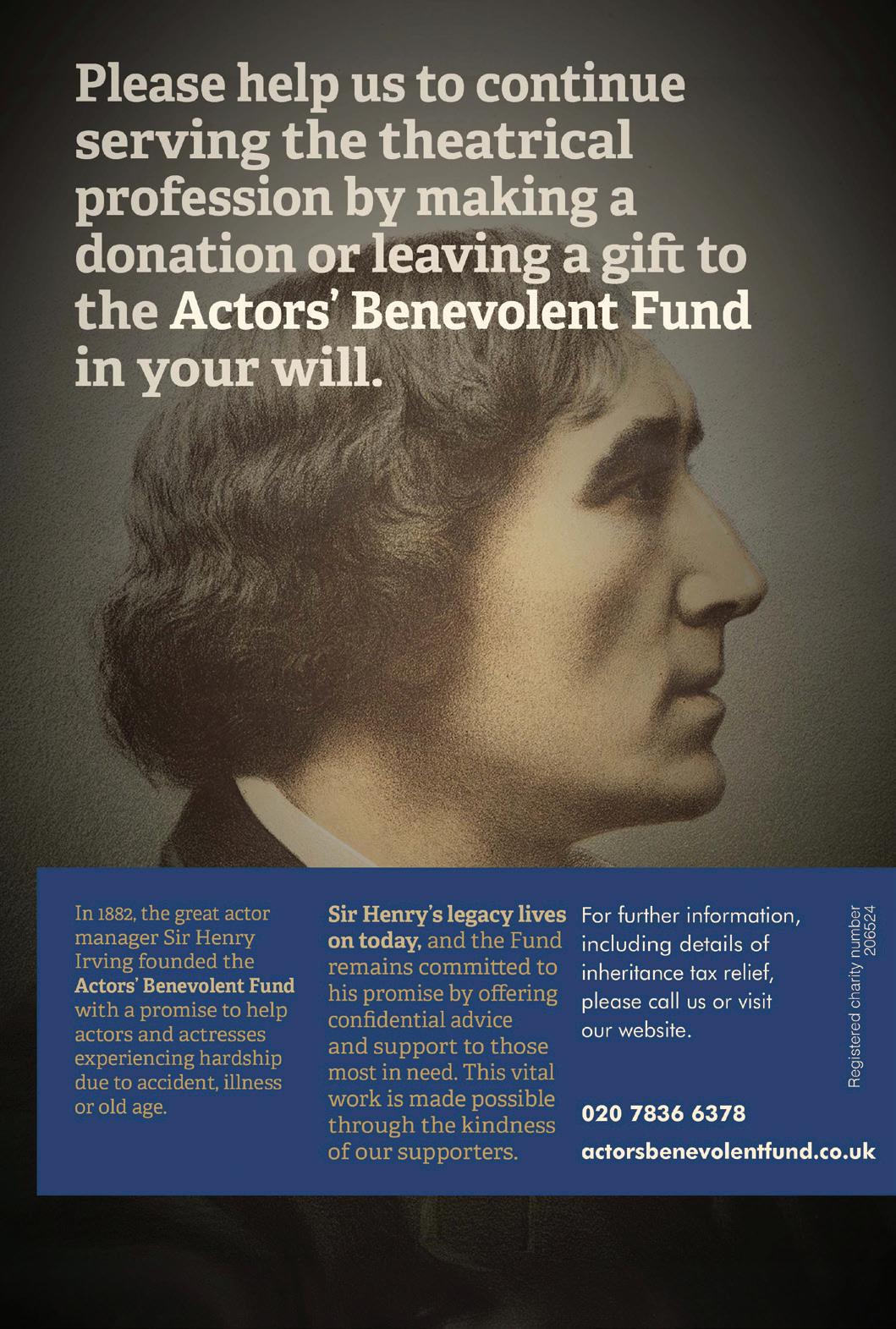



You may be tempted to reverse the question and ask what are the similarities between the two. Surely there can’t be any? But read on.
I recently attended the advanced mediation training course run by the Association of Northern Mediators up near Malham Tarn, in the rugged but beautiful North Yorkshire. It’s been run for 23 years, I have attended all but a couple of them, and we get some amazing speakers.
This time we had Phil and Damien, who had recently retired from the Metropolitan Police as negotiators with hostage takers. What a job! Remember the Balcolme Street siege? The Spaghetti House restaurant siege? How about the Iranian Embassy, where WPC Yvonne Fletcher was murdered? If you are old enough, you will undoubtedly remember watching the action on live TV where the SAS belayed down from the roof, threw stun grenades through the windows and retook the premises.
Well, this was not a failure in negotiation, since some situations are intractable and violence has to be used, but our guys are the ones who talk to the hostage takers (or those threatening suicide) to defuse the situation, make them appreciate their position is hopeless, and persuade them to surrender whilst releasing the hostages unharmed. Many of these situations we don’t even hear about.
How is it done? By active listening. Let me digress for a moment.
When I was taking advanced driving lessons, I was taught that many skills are remembered through mnemonics. For
example, the things you have to check before driving away are POWER: that’s Petrol, Oil, Water, Electrics and Rubber (tyres). Similarly, with negotiation the mnemonic is MORE PIES. And, remarkably, this is where mediation comes in, because the effectiveness of active listening is identical in hostage taking as in mediation. It’s remarkable, but true. So let’s look at active listening in detail.
With hostage taking, there will usually be a telephone line between the leader of the hostage takers and the police negotiator, who will have a team working silently to help him. With mediation, we have had the joint session at the start, and when I see the parties separately in their rooms, when I feel I have their confidence (it may be in the first meeting or a later one) I ask the magic question: “What do you seek to achieve today that you don’t have right now?” And the reply is usually surprising, and nothing to do with the formal case. These, then, are the techniques which the mediator (and the hostage negotiator) must use to find out what the other parry really wants:
M = minimal encouragers. Make short noises (hmmm, ahh, I see, go on) or smile and nod. I remember giving a couple of interviews for BBC’s File on Four (about rogue landlords and then the British National Party, since you ask) and I talk too much and too fast. The interviewer actually conducted me with her eyebrows, and I make a much better job of it.
O = open questions. A closed question invites only a yes or no answer; you don’t learn much. But with an open question, you encourage a full answer: Tell me, then what happened, etc.
R = reflection. Repeat some of the words they use, to show that you understand, and to encourage them to say more.
E = emotional labelling. Hear the emotion and express it back. Closely allied with reflection. Don’t worry if you express it wrongly; they will correct you and this all helps to build empathy.
P = paraphrasing. Hear their words and give back the same, but more briefly. Again, this builds empathy because, whether or not you agree with them (and who would agree with a hostage taker or a party in mediation with a hopeless case?) they will tell you their true needs.
I = I-messages. “You” is accusatory; “I” allows you to say the same thing in a less provocative way. For instance, if you suggest the person is lying, don’t say “You are a liar” which is likely to end the conversation, but say “I am confused; you said before X but now I’m hearing you say Y. How is that?”
E = effective pause or silence. When they stop talking, perhaps to think or because they don’t want to say any more, don’t be tempted to fill that silence with your own words. Silences are unnatural, so wait silently and they will be tempted to speak, and perhaps to reveal something really valuable.
S = summarising. Summarise what has been said, at more length that with paraphrasing. Use some of their words; they will see that you have understood what they were trying to tell you.
So this gives you an insight into what goes on in those private rooms in a mediation. Hostage negotiators bear huge responsibility in life or death situations, and I admit that mediation is seldom a matter of life or death. But it is hugely important to the parties, so the mediator carries huge responsibilities too. We are not just having a cosy chat with your clients; we are highly trained (well, most of us are!) and we have tools we can use to help them.
As May LJ said in Egan –v- Motor Services (Bath) Ltd [2007] EWCA Civ 1002:
“Mediation is a perfectly proper adjunct to litigation. The skills are now well developed. The results are astonishingly good.
“Try it more often.”
Biog : Chris Makin has practised as a forensic accountant and expert witness for 30 years, latterly as Head of Litigation Support at a national firm. He has given expert evidence about 100 times. He also performs expert determinations.
Chris is a fellow of the Institute of Chartered Accountants where he has served on the Forensic Committee, and as an ethical counsellor; he is a fellow of the Chartered Management Institute, a fellow of the Academy of Experts where he serves on the Investigations Committee, and a mediator accredited by the Chartered Arbitrators. He practises as a mediator, from his home in West Yorkshire and his rooms at 3 Gray’s Inn Square, London WC1R 5AH, telephone 020 7430 0333. He has mediated 100+ cases so far, on a huge range of subjects, with a settlement rate to date of 80%. For more see his website with videos:
www.chrismakin.co.uk
chris@chrismakin.co.uk


According to Law Society surveys*, professional indemnity insurance (PII) is one of the most significant outlays for a law firm.
As PII is compulsory it is not surprising that at times it can feel like a frustrating purchase. So what are underwriters looking for and how can you find an insurer that suits you?
The danger of optimism bias
Optimism bias,** the tendency to overestimate the likelihood of experiencing positive events and underestimate negative ones is a challenging mindset when it comes to managing risk. The reality is that claims against law firms do happen. At HDI, we have insured hundreds of firms on a primary basis for over 15 years. In this time, we have seen many examples of claims and allegations brought against law firms. The financial, emotional and reputational toll can be huge.
Law firms are operating in a rapidly changing world, and it feels as though the pace of change is increasing. At HDI we believe in preparation rather than in prediction, and we insure firms whose values align with this business philosophy. We can’t always see what is coming, so building resilience within the firm is key to navigating what might come next.
At HDI, what are we looking for?
As your insurer, we are there for you when the worst happens. However, insurance is just one tool in your armoury against risk. We look for firms that invest in a clear and robust risk management strategy. We want to hear about how you identify and manage risk in your firm, which can include risk management planning,
business continuity plans, file review policies, supervision policies and external audits.
When reviewing a firm’s proposal form, I like to pay particular attention to the answers that help to give me an insight into the culture of the firm. Your submission can be really enhanced for example, by sharing the history of your firm, any particular specialisms, your future goals, the type of work you like to do and the type of work that you would turn away. These things allow us to take a more holistic view of your firm, beyond the rating data that is captured in a proposal form.
Getting your submission in early and in full order is vital. Work with your broker to ensure you have up to date claims summaries. It is also really helpful to include a narrative around any open and closed claims. Things like, what the allegation was and what lessons have been learned. The fact that you may have experienced a claim is not always an issue – at HDI we recognise that there is often a story and we are open minded and willing to listen.
We are seeing an increase in the frequency of high value claims. The reasons for this include, rising asset values, more complex transactions and defence cost inflation. Worryingly the market has begun to see claims exceeding the compulsory primary limit. Firms should have heightened risk management measures in place when taking on matters of high value, or when acting for clients of considerable net worth.
Conveyancing remains the main source of claims, both from a frequency and an overall cost. In
addition, there is a notable jump in claims from wills, trust and probate work. The drivers for this are a combination of more complex family structures, increases in overall estate values and the challenges that can arise with people living longer. Our advice is that this would be a good time to conduct a review of policies and procedures and implement targeted refresher training for staff.
Looking further into the future, insurers will be considering the impacts of the economic and political environment as drivers for claims, the impact of AI, the continued threat from both cyber and fraud. At HDI we believe that we have the strength and stability to support our insureds now and for the long-term.
If you are a firm with a turnover of under £20m and would like to obtain a quotation from HDI please contact Lockton Insurance Brokers.
Solicitors@lockton.com 02079332034 / 02079332083
* https://www.lawgazette.co.uk/ news-focus/news-focus-trends-inprofessional-indemnity-insurance2023-main-findings/5116726.article
** https://en.wikipedia.org/wiki/ Optimism_bias

Sarah White, Underwriting Manager, HDI Global Specialty SE

As all Deputies and Court of Protection specialists will know, applying for a Statutory Will can be a complicated and time consuming matter. As part of the duty of care, and requirements for making a Statutory Will, it is necessary to hold a copy of the person’s existing Will, a draft of the proposed Will, details of their family, assets and income, as well as medical evidence of their incapacity in order to provide these to the court, together with any other evidence the court requires.
Anyone who would be potentially affected by the application (perhaps a beneficiary who would lose out, for example) will be a party to the court proceedings. Finders International specialises in researching P's next of kin, providing a verified family tree and a full report of the required findings to support your Application to Court.
Here are some of the ways in which a probate genealogist can help:
1. Verifying Family Tree Information: We can conduct thorough research to trace and identify all of P’s next of kin according to intestacy rules. We can do so with little or no contact with the family, at the authority of the Deputy, and ensure that our research is backed by documentary evidence.
The court or the deputy may receive information about P’s family from various sources, including family members. This information can often be inaccurate; therefore, we can verify the accuracy of any information already held, ensuring that the family tree is comprehensive and reliable.
2. Resolving Complex Family Scenarios: In cases where the family structure is complex or unconventional, a probate genealogist can provide expertise in unravelling intricate family scenarios. This includes stepsiblings, half-siblings, or other unique family relationships. With modern families spread across the globe our
international expertise can assist in even the most complicated of family make ups, and wherever people may live.
3. Ensuring you are aware of P’s existing Will & financial assets Ensuring you know of any Will P may have made in the past is crucial to this process. Finders can assist by conducting a comprehensive Will Search to identify any Will that may have been made before P’s affairs were managed under Deputyship Order. Additionally, a full missing asset search can also be conducted for P, ensuring that you are aware of the full financial picture.
4. Providing Evidence for the Court: The findings of a probate genealogist can be presented as evidence to the Court of Protection. This documentation helps validate the accuracy of the family tree and ensures the correct family members are notified of the process.
Insights into the research process
A question that we are often asked is, ‘How do you do it?’ Many who have researched their own family tree will know that birth, marriage, and death records are essential in confirming findings. At Finders International, we also have inhouse databases, local representatives, and a network of international researchers to assist with our research. Each case comes with its challenges, including children born out of wedlock, overseas research and common surnames. Our team work on cases with these elements on a daily basis and carry out research for Court of Protection teams all over the country, so have the experience to overcome these research hurdles.
At the point of our instruction, the only information held was that P had a deceased partner and one living cousin.
Our research first confirmed that P had no children and was an only child.
Extensive research using all available genealogical resources confirmed that P had no living Paternal family. However, we confirmed that P’s maternal family was larger than expected.
During the course of our research, we identified 6 maternal aunts and uncles who left descendants, identifying a number of living cousins.
As part of our verification process, we obtained birth, marriage and death certificates and identified current addresses for all P’s next of kin. This information was provided to the Deputy in an easily digestible family tree and report, with appropriate supporting documentation. In this case, at the Deputy’s request, no contact was made with the family before our report was submitted.
Our involvement in this case was key, as we identified three more family members in addition to the cousin previously known. This full picture enabled the Deputy to proceed with the Statutory Will Application and notify all the correct next of kin.
Our expertise in genealogical research ensures a thorough and accurate representation of the P’s family connections, enabling confidence in the information provided to the Court for the purposes of obtaining a Statutory Will.
Finders International can assist predeputyship application if the court requires you to contact family, friends or neighbours of P. We can also assist with Statutory Will Application research, Missing Will and Assets searches, Administrator searches and Unoccupied Property Insurance. If you have a case like the above or have any questions regarding our services, contact us today at quotes@findersinternational. co.uk, call 0800 085 8796 or visit our website www.findersinternational.co.uk

